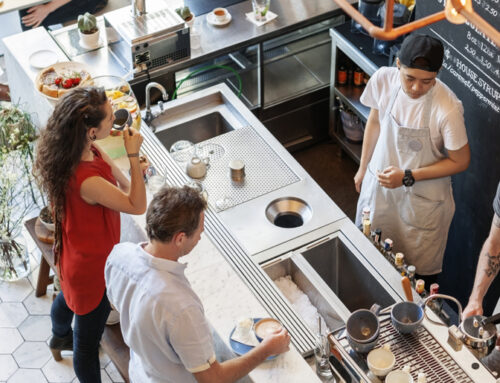Throughout the pandemic, foodservice businesses have had to adapt to drastic changes in consumer demand that not only prioritize individual health but also the wellbeing of the planet. This focus on sustainability may not be a new concept, but young consumers – specifically the Gen-Z generation – are looking for the next “normal” to be heavily focused on environmentally-friendly practices.
As Gen-Z patrons enter the working world and start making their own informed financial decisions, there is a major opportunity for restaurants, coffee shops, and cafes to connect with this younger audience. To help you get your food establishment aligned with this trajectory, here are 6 foodservice sustainability practices to implement this year to get on the path toward a greener future.
1. Keep Your Menu Seasonal
Syncing your menu with the seasonal flow of produce is a great way to keep your menu fresh with new recipes while also helping reduce travel costs and emissions. In-season produce is generally grown closer to where it is sold, so it does not need to travel long distances (reduced transportation emissions) and won’t spoil along the way (reduced waste).
In addition to the eco-friendly benefits, incorporating seasonal recipes into your menu presents the opportunity to offer limited-time items. By creating a sense of urgency, you will be able to attract and retain young customers who are constantly on the lookout for their next favorite sustainable food or beverage.
This is not to say that you should completely rewrite your menu or neglect your best-sellers. A great place to start is finding ways to incorporate seasonal produce into what you are already serving. As your kitchen staff and baristas become more comfortable with these ingredients in their cycles, your business can learn to adapt to the changing palettes and preferences.
2. Buy In Bulk Locally
In conjunction with buying in-season produce, you should also consider buying resources in bulk from local vendors. This is a cost-effective solution for your business that can further reduce travel carbon emissions, eliminate the need for plastic product packaging, and can help you cut time and costs that you normally would spend on daily or weekly food item replenishment.
The amount of energy it takes to produce many key ingredients, like nuts and spices, is often less when sourced locally. By supporting local vendors that provide honest services like yours, you will show that you are invested in leaving a greener coffee footprint within your community for generations to come.
3. Manage ALL Of Your Waste
Sustainable waste management has been an important topic for years but has gone into hyperdrive as Gen-Z customers emphasize the need to use less, spend less, and waste less.
To manage your business’s waste better and make it easier for young consumers to contribute to this cause, consider ditching plastic materials as much as possible and opt for sustainable options such as paper straws, bamboo or wooden utensils, and paper cups. Joining a dedicated recycling program, such as Terracycle, can further assist you in your sustainability endeavors by providing the resources you need to easily manage your recyclables. For managing food scraps and leftover coffee grounds, incorporate composting solutions in your kitchen and start gauging your audience’s intake so you can adjust portion sizes accordingly.
4. Invest In High-Quality, Energy-Saving Equipment
Young customers have high standards for the food and beverage quality they consume, so carrying equipment from high-quality brands that meet this demand is crucial.
Though it may seem more sustainable to save used appliances from going to landfills, a new machine could serve your sustainability efforts better in the long run. Many modern equipment solutions for the foodservice industry are designed specifically to be energy-efficient and eco-friendly. Additionally, these pieces of equipment are built to serve you longer, are easier to operate, and require less maintenance, resulting in a higher ROI.
In addition to employing the right eco-friendly equipment, you can also implement sustainable practices like putting a timer on your lights, opening windows on nice days instead of using air conditioning, or installing low-flow toilets and sinks to help conserve water and electricity.
5. Offer Digital Menus And Ordering Capabilities
The convenience of online ordering and digital menu viewing is a luxury that became a necessity in response to COVID-19. Young consumers have especially enjoyed its value since they rely heavily on technology to conduct most of their daily tasks. This digital solution, which will still be used post-COVID, not only addresses their health concerns through contactless service but helps your business reduce waste from paper menus and printed receipts.
Regardless of whether your main operations are conducted in-store or through delivery services, taking your services online is a great way to connect with Gen-Z customers and show them that health and sustainability are the core values of your brand. Try implementing QR codes that link to your menu and allow guests to order and pay from their mobile devices. You can also set your POS system to give customers the option to have their receipts sent via email rather than through paper receipts.
6. Market Your Sustainability Efforts Online
Aside from implementing physical sustainability practices within your food establishment, your online and social media presence should reflect your efforts. Marketing your brand in a way that young consumers understand and want to share with others has the potential to boost your revenue so that you can continue to invest in even more sustainable resources.
Staying active in the topic of your foodservice sustainability practices while actively engaging with young consumers can help you grow your following and build trustworthy connections. However, you must be careful not to “greenwash” your presence. Ensure that you are not over-posting about your new sustainable implementations and avoid making claims that you can’t back up with factual evidence.
Conclusion
By adapting to these foodservice sustainability practices, your foodservice business has the potential to significantly increase your reach and sales from Gen-Z and subsequent generations. Even more importantly, you will be contributing to a brighter, greener future for the foodservice and coffee industry. For more information on the latest industry trends and business support, get in touch with us today.







